This paper is a part of the series: Political Islam in Focus.
Taliban dominated Afghanistan at a time where the political Islam parties presence receded in the Middle East. Al-Adala wa al-Tanmya (Justice and Development) Party in Morocco failed in the parliamentarian elections held in Morocco in September 2021 (obtaining only 13 seats) after this party was on top of the contenders in 2016 elections, obtaining 125 seats then. In Tunisia, the Tunisian president; Qais Sayed, announced a package of emergency measures, most significantly of which was freezing the parliament work after the stagnancy the political life witnesses in Tunisia, needing, thereby, the domination of al-Nahda (the Renaissance) party on the power. In Iraq, on the other hand, the parliamentary elections delivered the result that all parties close to the Muslim Brotherhood have got no seats.
This is why the expansion of Taliban Movement was a glitter of hope at a moment of weakness for political Islam supporters, who celebrated such victory and became optimistic that the situation in Afghanistan would be reflected on everyone. This idea is over exaggerated, in addition to that predicting it is too early, because Taliban is still in its early steps as a political organization that undertakes the management of general affairs decades after behaving as an armed movement. The current situation {of Taliban in office} comes after a previous attempt to rule from 1996 until 2001, where the Movement embraced the Medieval Ages logic in submitting the citizens neglecting their livelihood needs.
This Research Paper reviews the experience of Taliban's first months in ruling Afghanistan in order to answer the following questions:
1. What are the main scenarios of Talibanist Afghanistan?
2. Wow would such scenarios be reflected on the general landscape of Sunni political Islam?
The Evaluation
Taliban is showing flexibility and resilience in ruling Afghanistan. On a hand, it was bold to issue statements either than the typical image we have in minds. On another hand, Taliban in not tolerant towards violating its orders or any breach for its sharia interpretations.
Due to the fact that survivability the aim of any political system via political means, then a long pace lies in front of the Afghani caretaker government to rehabilitate a country it inherited which its political, economic, and social structures are dismantled. For the sake of this pace, the Movement has powerful cards, which of well utilized, may enable Taliban's government to decrease the costs and increase the gains. On the contrast, the current caretaker government is facing "existential" challenges that should be anticipated in order to avert extremist scenarios this paper would address.
An analysis of strength and weaknesses points during the first months of Taliban rule shows the following:
Weaknesses:
1. The collapse of the social economy in Afghanistan: the scale of the economic suffering the Afghani people experience is no secret for who are concerned with the Afghani affairs. This suffering can be referred thereto by what Wilson Center came across in a session held on November 2021: the numbers of who suffer hunger in Afghanistan jumped from 14 million in August to 23 million. These numbers may soar by winter and by what climate changes potential frost.
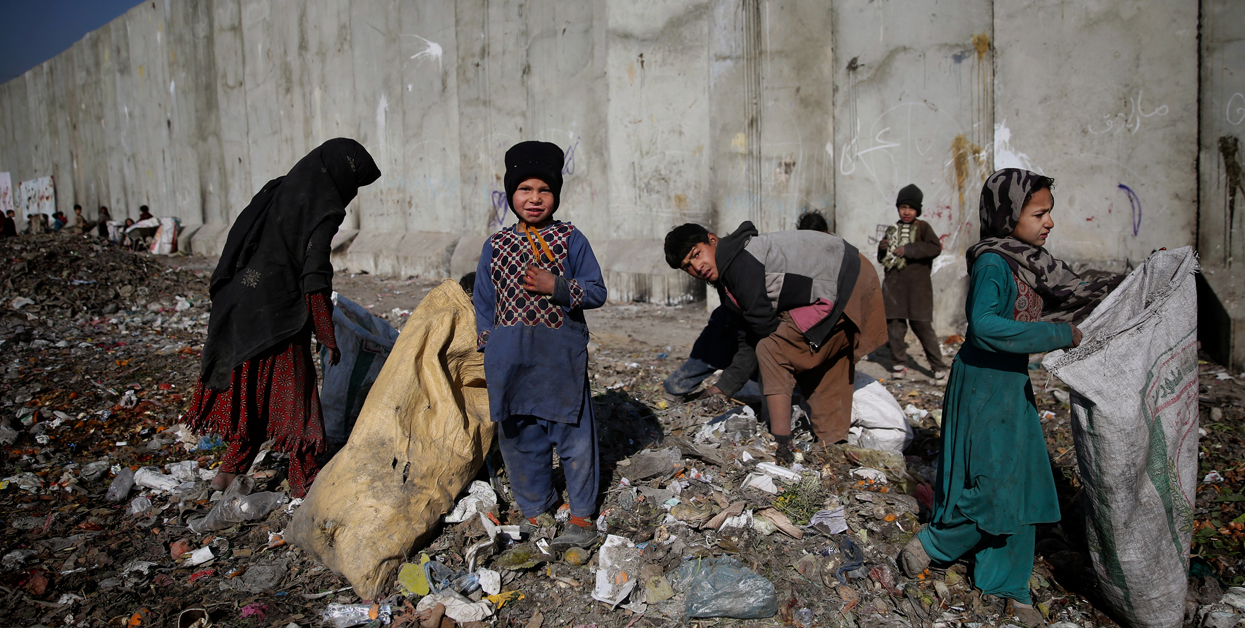
Due to freezing the 7 billion UDS of Afghani assets at the America Federal Reserve, and due to suspending the work of Investment Fund to Reconstruct Afghanistan -which is managed by the World Bank and contributes 30% of Afghanistan's budget- the Afghani currency is close to a "free stall" similar to what is happening is states like Venezuela, Syria, Lebanon, and Iran. Before Taliban came to power, the Afghani currency used to be equal to 77 dollars, but it touched 125 USD in the middle of December.
This monetary crisis led the economy officials to restrict withdrawing the foreign currencies from the Afghani banks, the matter which mad the relief agencies in Afghanistan be in a status of dysfunction, not to mention isolating Afghanistan from the international economic system due to the fact that it is difficult to find economic entities that would "take the adventure" of conducting commercial transactions with Afghanistan.
2. Constituting a non-representing government: in spite of the cautious positive atmospheres which Taliban attempted to promulgate to the world and Afghanistan after it took the helm, Taliban constituted a "narrow" caretaker government nevertheless, which contained o one of those who are outside Taliban's political and ideological orbit. On the contrary, such government included some of who are listed on the America list of sanctions, in addition, some of the Haqqani Network, classified to be terrorist, were assigned to the security file.
Scrutinizing the government members demonstrate that the lack the bureaucratic experience to undertake the governmental affairs; many of them had never practiced any governmental work and did not occupy positions in managing the public affairs, the matter which makes Taliban be in a bad need to the benefit from the experiences the technical citizen who were in the previous government.
This government -rather: the post 2001 political system- did not establish any active administrative system, so, Taliban should commence a pace of a "comprehensive reconstruction" that is not limited to the material buildings, but it should expand to reach all aspects of life, the matter which the Afghani government is still it its first steps to conclude. This is, of course, unless a setback would happen that may increase the Afghani arena imbalances.
3. The armed demography: the Afghani population is around 40 million. The components of Afghan demography are distinct upon national, racial, and religious basis. The Pashtun race is the backbone of Taliban, forming 40% of the population. In the north, the Tajik demography is dominant over such geographic area situated on the borders of four states: China, Uzbekistan, Tajikistan, and Turkmenistan. A demographic existence for the Shiite is represented by the Hazara race, who form 9% of the population.
The rapidness of Taliban's domination over the Afghani provinces was affected by the residents' identities. Panjshir (means in Tajik language: the Five Lions) was the last of such provinces. Panjshir remained obstinate to Taliban in its first period in power 1996-2001 as its mountains terrains and demographic components made it an invincible fortress and a start-point to topple Taliban's rule in 2001 supported by the International Coalition.
The demography either that Pashtun are spreading all over Afghanistan, making it easy for foreign parties to arm in order to achieve certain purposes all along the Afghani geography. In addition, such components are still suspicious -in the minimum of a description- of Taliban Movement, affected with Taliban's ideological background and its political past, which Taliban claims that its present is different from.
However, some violent manifestations and events are reconfirming the continuation of such past, like Taliban's execution for 13 Afghanis of the Hazaras minority late August, 11 of them are from the Afghani Security Forces while the other two are civilians. The Husainis (Shiite religious celebration facilities) are suffering terrorist operations ISIS Organization, and its offshoot; Khurasan claim responsibility for. Even is Taliban and ISIS are undergoing the "operative enmity" phase, but the ideological links and the "brotherly" sympathy are decreasing such enmity, which many Afghans believe that it does actually exist.
4. The Equivocal Identity: Taliban is never able to take its ideological garment off, even though its political current recommends adopting a pragmatics logic in dealing with the domestic and foreign affairs. There is a military and security current with Taliban, dominated by Haqqani network, in addition to fundamentalist leaderships where both never "maneuver" when it comes to Sharia issues.
In addition to the phenomenon of "splitting into currents" which Taliban is experiencing due to its relatively "openness" policy, there is a sort of "an ideological vacuum" ISIS is fast to fill via recruiting more terrorists, and attracting Taliban's members and supporter who reject Taliban's superficially-new policies.
By the American withdrawal from Afghanistan, the terrorist cells have more flexibility in mobility and operational acting. Besides that the American withdrawal chaos led to open the jails and the escape of hundreds of terrorists, some of which are classified Very Dangerous, just like it happened with Bagram Air Force Prison, where some al-Qaida leaders were there in custody.
5. The International Contend and the Limited Foreign Links in the Light of the International Unrest: Afghanistan is situated in the heart of Middle Asia, the matter which makes it dominate the regional link in the American geostrategic considerations: the Middle East and the Far East.
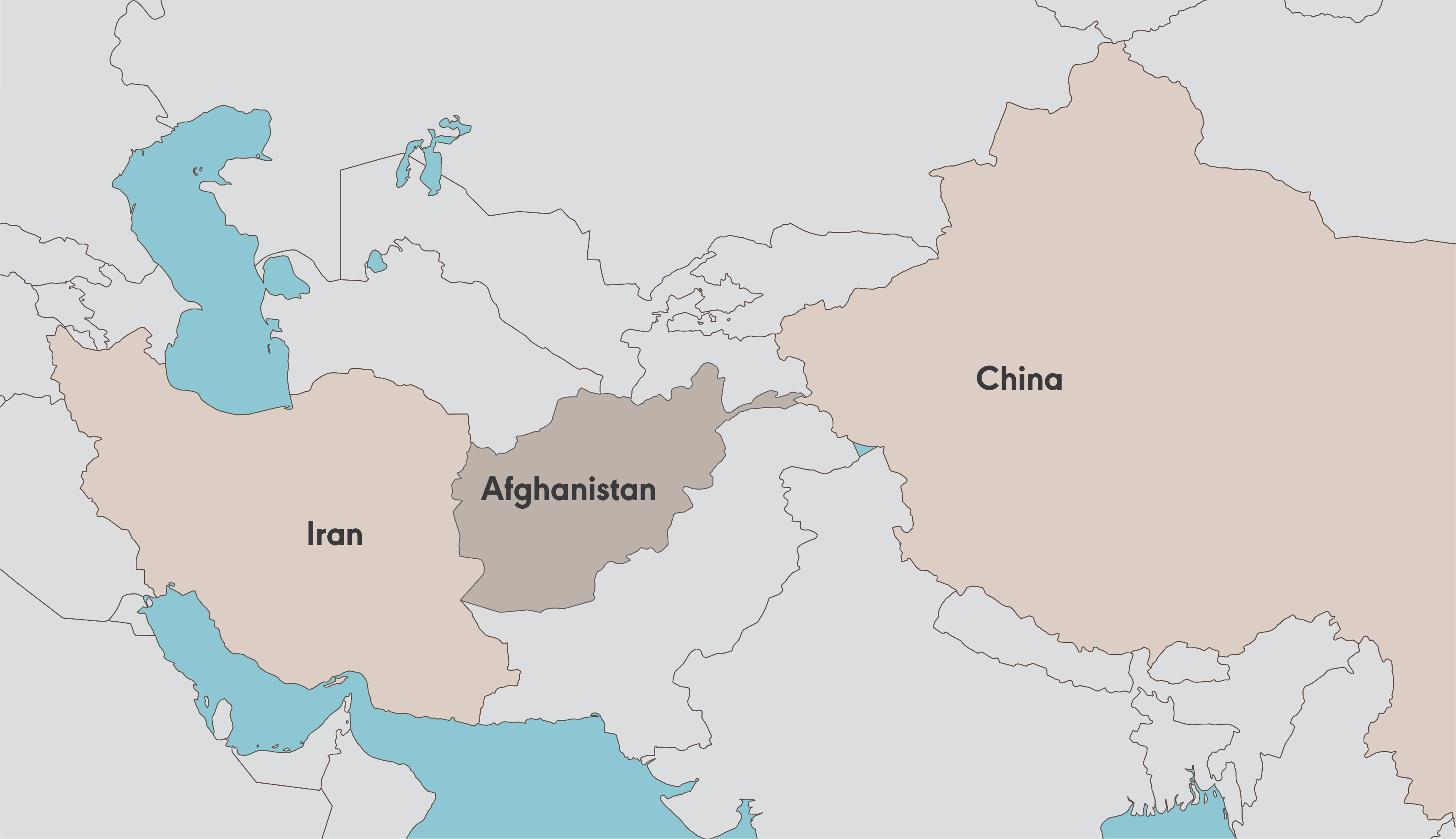
Security reports are saying that an accepted development shall be witnessed at the Afghan-Chinese borders related to order terrorist groups to operate on such borders, taking into consideration that Idlib file is underway towards a political decision, the matter which may lead to transfer the terrorists to such borders. It should be mentioned that many of those terrorists are descending from the Uyghur minority, which UN reports -China rejected- said they came under compulsory procedures imposed by China.
Afghanistan has many natural resources, which may lead the international contend to increase within its lands. The most important menial therein is the lithium; the core metal in manufacturing electric cars' batteries. According to Old Price site report issued in August 2021, the untouched menial resources in Afghanistan are in more than one trillion USD.
This security and geoeconomics contend requires a foreign Afghani network that has links and communication channels with the different international actors. Years of negotiations founded a "limited" foreign network for Taliban, which pillars are Doha, Islam Abad, and Ankara. These three capitals are contending to some extent in order to increase their presence in Afghanistan.
Practically speaking, the international stands towards Afghanistan are centered according to the American or Chinese vision. The American vision is concerned with the trans-border terrorism, containing the raise of China, and the human rights issues which the White House in the tenure of the Democratic president , Joe Biden, keep on reminding the International system with such issues as a driver of the international interactions, according to the American vision.
As for China, it is concerned that no terrorist groups would be located close to its borders, and in paving the way politically for its potential economic investments, as Beijing is adopting "no intervention in domestic issues" policy.
Between these American and Chinese visions, the Talibanic Afghanistan needs to conduct its foreign policy without irritating a party via "being in the trench" of the counter party, or the crises would keep on proliferating without a horizon of solution. Based on Taliban's experience, adopting a sort of positive-neutralism seems to be likely, as Taliban has no tools or cards that enable it to maneuver between the different regional and international parties.
6. The Lack of the International Legitimacy: the challenge addressed in the previous paragraph is caused by the lack of the international community's legal recognition of Taliban's dominance over Afghanistan. World's countries are almost in a consensus that such recognition would ensue Taliban's prove that it represents the Afghani people entirely, and that it can act like a normal component in the international system.
The goal of acquiring the legitimacy was afflicted with a setback after constituting the caretaking government, for even Taliban's alliances did not welcome such government, deeming it "a first step" and renewing their demands that the government should be comprehensive and representing all Afghan people.
The international legitimacy is considered to be the base of solving the dilemmas Taliban is facing, besides being the pillar to enhance rule, and the actual reflection to the Afghani government's ability to meet its commitments towards its people and the international society.
7. Post 2001 Generation: the generation of the third millennium did not experience the rule of Afghanistan. They were brought up in an educational and mass media system delivered by the political system supported by the International Coalition, which means that those teenagers are having the "seed" of liberty and secularism, and that they are not afraid of Taliban policies comparing to who lived under the former rule of Taliban. In addition, social media contributed in enhancing opinion expressing outside the authority's restrictions.
Those zealous teenagers have developmental livelihood demands, the simplest of which is affording job opportunities. This generation does not favor the logic of the political and social guardianship, the matter which makes them be a pressing element confronting Taliban's aims in calm control without having to be in enmity with demographic components.
Indeed, there are international concerns regarding what has been accumulated on the way towards the rights and freedoms in Afghanistan after 2001. This does not mean that a drastic change didn’t occur on such levels since that time, for Afghanistan is still of a tribal feature with conservative tendencies, but the main cities are deemed to be points of attraction for whoever wishes to have an individual freedom.
Strengths:
1. The International Recognition throughout Combating Terrorism: in terms of security, Taliban met its pledges in combating terrorism until the end of 2021, whether that was through targeting the terrorist cells or through adopting a moderate method, that was far from the religious and intellectual extremism which was Taliban's development feature.
What encourages Taliban in the efforts of combating terrorism is that there is a status of international abstention from using terrorism as a factor of practicing pressures, for everyone is convinced that the path of terrorism in unpredictable, and that it may afflict its operator in some conditions.
2. The geopolitical location: on the contrary to the Point of Weakness No. 5 and the limited foreign links in the light of the international unrest, the Afghani government can invest the geopolitical and economic privileges the country is rich with in order to improve its regional and international position. Adopting balanced policies can turn Afghanistan into a spot of attraction instead of being a tension focal.
3. The American Leftovers: the military wing of Taliban has a massive "spoil" of the Us army and the NATO after the quick withdrawal which did not enable the American officials from destroying the medium and heavy military equipment. Taliban also took over all the military arsenal storages that were for the Afghani forces, which did not engage in any real fight against the expansion of Taliban.
According to two reports in the BBC and Los Angeles Times; Taliban has around 2000 Humvee vehicles and more that 50 armored vehicles, some of which are anti-mines. Most of the 167 aircraft which were in Afghanistan until the end of June are now under Taliban's disposal. Military experts estimate that one-third of what the USA spent on the Afghani forces -83 billion USD- was spent on the military equipment, which means that Taliban has equipment worth billions of dollars.
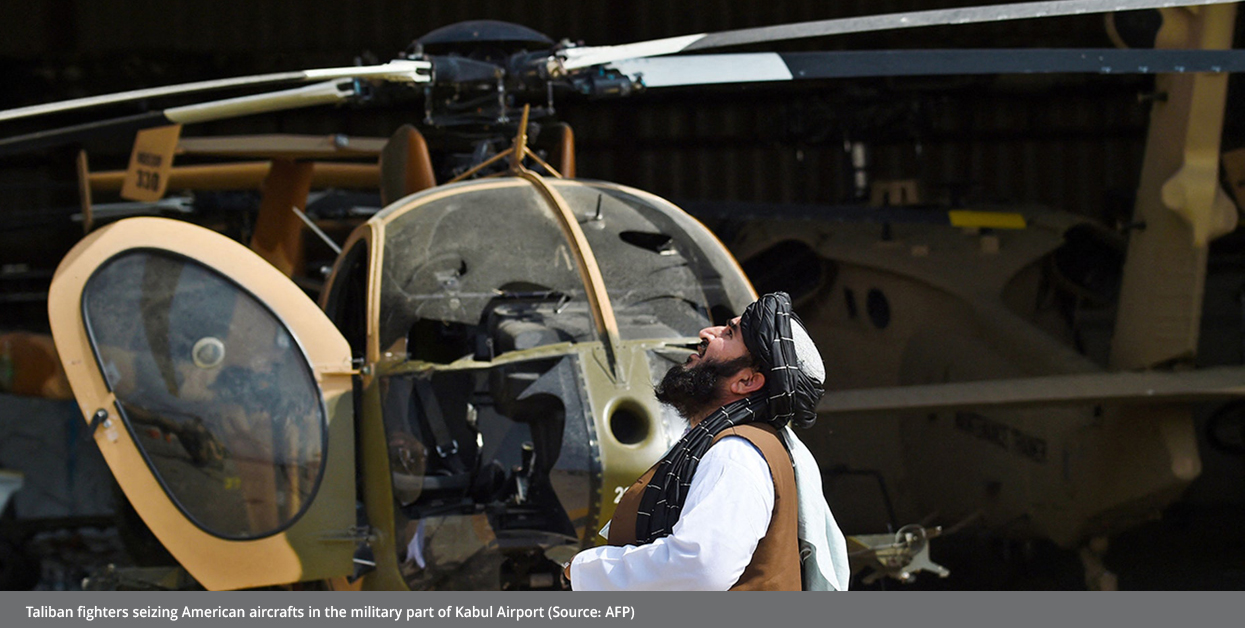
On the other hand, some experts underestimate the implications of owning such equipment, for Taliban lacks the qualified personnel to operate this equipment. The USCENTCOM reveled that the important parts of the significant military units were destroyed, and that such units cannot be operated as an integrated system.
The danger of the seizure of the wrong hands on these equipment is still there of course, where those equipment may be owned by Khurasan or a rebellious wing of Taliban who wishes to bring the situation as it was before according to its jurisprudence interpretations of foreign affiliations.
4. The Migrants Issue: Afghanistan is considered to be a nation-in-lock; it has not sea port. As for air, Kabul International Airport is almost out of service in the light of airlines boycott to navigation movement from and to Afghanistan. Thus, there is no main hub for who wish to migrate except for the official land ports, or sneaking from the pockets on the borders.
Should the livelihood conditions in Afghanistan exacerbate, many Afghans would have to seek the neighboring countries, the matter that may affect Middle Asia entirely, and the international stability in general.
The Syrian refuge crisis had proven that migration is deemed a demographic, security, and an economic dilemma over the hosting countries. Currently, the Belarussian-Polish borders are classified as an arena of a "hybrid" tension due to the influx of refugees, which the Polish authorities, and the Western authorities in general- describe as a Belarusian political mean of pressure with a Russian support.
So far, no influx of Afghan people happened yet. But Taliban can indicate using such card if the conditions go worse and if the challenges it faces may go deeply rooted.
“Uncertainty is the only certainty there is”
It is difficult to predict the path of Taliban's domination on Afghanistan endurance and nature. The domestic and foreign environments are open for all possibilities. According to what has been mentioned in this research paper, the points of weakness outnumber the points of strength. Some points of weakness are chronical and cannot be addressed on the short term.
With these facts in mind, the operators and supporters of political Islam will observe Taliban's ability to move and endure. Whether he who is concerned with the Afghani affairs is sympathetic or opponent to Taliban, the realistic logical reading indicates the Talibanic Afghanistan's future ranges between the following:
(The emerging scenario might be a combination of two or more scenarios, for the scenarios are intersected)
1. The caretaker government is impotent to fulfil its tasks to the people due to reasons either to what has been said in "the Points of Weakness", and the eruption of peaceful protests calling for services, the matter which may make Taliban be in front of two paces:
A. To politically contain such protests, and to surrender to the demographic components awarding them federal administrative independence, along with preserving a unified Afghanistan via a military, monetary, and foreign unified authority.
B. The confrontation then engaging in a civil war, turning Afghanistan into a clear international example for the "failure state". This war would continue by the continuation of foreign support which the belligerent parties may have, or a settlement can be reached. Such settlement can be throughout federalization of "Balkanization" where a state is fragmented into two or more states, and the political borders of such state would be changed.
2. In relation to the first scenario, the collapse of the security conditions would be a chance for the international terrorism to refresh and direct its capabilities towards it old goals, or towards new goals like China or India. The terrorist assets are still where they were in Afghanistan in terms of the save heavens, the incubators, the steep mountains, and the limited security capacities of the Afghan authorities.
3. This return of terrorism in Afghanistan may lead to unify the efforts to constitute an international coalition to topple the government. This scenario is unlikely to happen due to that Washington dedicated its capabilities to deal with dangers coming from the states -China and Russia in the first place- not to combat terrorism.
Nevertheless, should terrorism spread in Afghanistan, then a form of the American and Western intervention to counter terrorism is inevitable. This might be through reviving the local "Alliance of the North" composed of the Uzbek, the Tajik, and the Hazaras, where such Alliance played a significant role on the ground to confront Taliban in 2001.
4. The success of the current version of Taliban, where it carries on enhancing its "rigid" existence, and ranging in managing the state between the political wing moderateness and the security wing extremism. This success, if achieved, would be boosted with improving the economy and services with a help from China, Pakistan, Qatar, and Turkey.
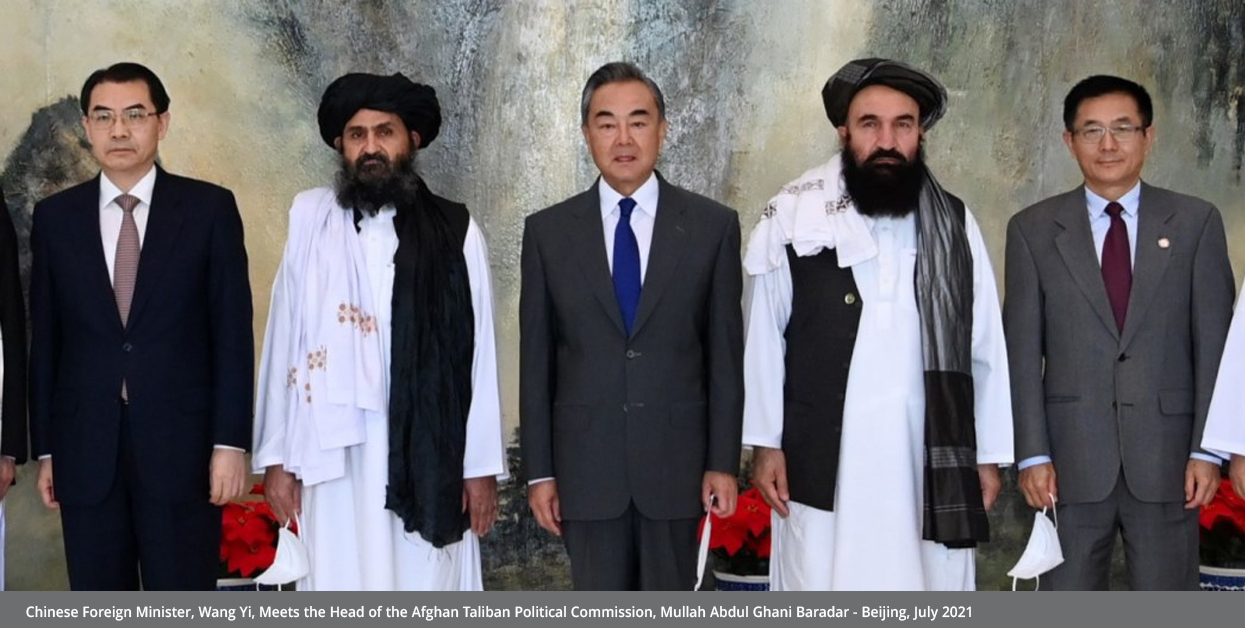
5. Taliban returns to its old political logic, halting conciliatory and open discourse, and the domination of the extremist wing over the power entirely. Such dominance might take place consensually within Taliban's work frames, or it may be compulsory after massive clashes.
Implications on Political Islam:
Talibanic Afghanistan's relation is largely affected with the political Islam's international landscape via Taliban's ability to endure; and with its ability and method. Should the local pragmatic current, which is open it its foreign relations, is the decisive factor, then such effect is limited. But if Haqqani's current was to take the helm, then it would tend to establish its relations as per the interests and tendencies of its "brothers" in different countries.
Due to that it is unlikely for the Taliban's extremist current to continue, it is expected that such continuation may not be reflected on more momentum for political Islam. The Mediterranean and the international experiences had proven that troubles come one after another on political Islam groups, when they go too far in ideologizing their foreign relations or communicating its counterparts in different countries violating the normal official frameworks. The reason is that such ideologizing may lead to form a counter axis by states which political Islam intimidates their stability and interests.
After the Muslim Brotherhood experience in Egypt, Taliban would think twice before allying a party. The security problem of political Islam, in many of states' considerations, come from being a trans-border propaganda mean, which threatens any country that do not conform with any of political Islam's methods. Therefore, Afghanistan might distance itself from entering a regional spiral of ideological polarization, at least on the short run, that means that Taliban's communication with its counterparts would be within the minimal limits.
In addition, the capitals supporting trans-borders political Islam had enough of incurring the political costs of such a support, those capitals started to change their stances and make reviews due to regional and domestic considerations. Most states -including Afghanistan- are busy in their local affairs and addressing Covid-19 ramifications.
But if Talibanic Afghanistan collapses, then this would be a setback to the programmatic political Islam of a moderate discourse. Nevertheless, the extremist terrorist version thereof may recover if Afghanistan becomes an international hotbed of terrorism after losing significant strongholds in Syria, Iraq, and Africa.
Keep in touch
In-depth analyses delivered weekly.

Related Analyses:







.jpg)
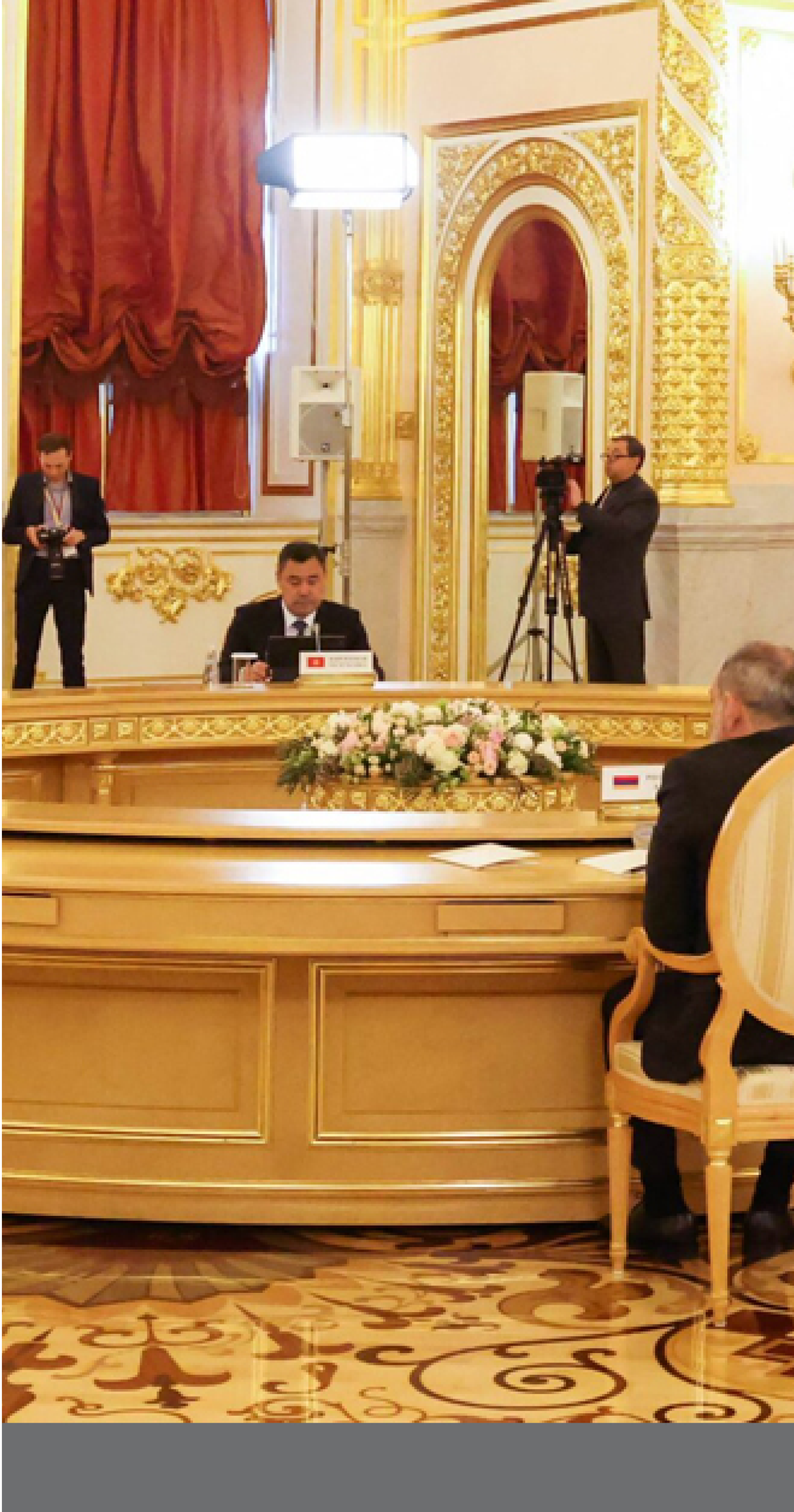
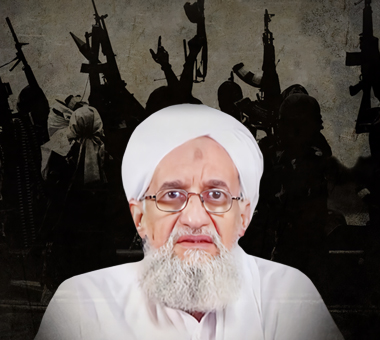
.jpg-%D8%A7%D9%93%D8%B3%D9%8A%D8%A7-%D8%A7%D9%84%D9%88%D8%B3%D8%B7%D9%89-%D8%AA%D8%AD%D8%AA-%D8%A7%D9%84%D9%85%D8%AC%D9%87%D8%B1-%D8%A8%D8%B9%D8%AF-%D8%B3%D9%8A%D8%B7%D8%B1%D8%A9-%D8%AD%D8%B1%D9%83%D8%A9-%D8%B7%D8%A7%D9%84%D8%A8%D8%A7%D9%86-%D8%B9%D9%84%D9%89-%D8%A7%D9%94%D9%81%D8%BA%D8%A7%D9%86%D8%B3%D8%AA%D8%A7%D9%86.jpg)
.jpg-%D8%B7%D8%A7%D9%84%D8%A8%D8%A7%D9%86-%D8%A7%D9%81%D8%BA%D8%A7%D9%86%D8%B3%D8%AA%D8%A7%D9%86.jpg)
.jpg-h%D8%A7%D9%88%D8%B1%D8%A7%D9%82-%D8%A7%D9%81%D8%BA%D8%A7%D9%86%D8%B3%D8%AA%D8%A7%D9%86.jpg)